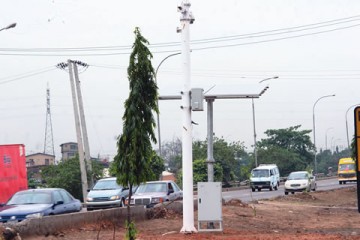Teddy Oscar, Abuja
The House of Representatives has given its committees on ICT and Public Safety & National Security two weeks, within which to investigate the failure of the video surveillance and Close Circuit Television Cameras (CCTVs) to detect criminal activities across the federation, and report back to the House.
This followed a motion on Wednesday by Hon. Saviour Friday Udoh, who noted the precarious nature of the current security situation in Nigeria, despite the efforts of the Federal Government to forestall the incidences of insecurity.
The motion is entitled: urgent need to deploy video surveillance and CCTV cameras to check insecurity in Nigeria.
“The Federal Government, sometime in the early part of the administration of the late President Umaru Musa Yar’Adua, awarded a contract for the installation of CCTV known as Public Security Communications System (PSCS) at the initial project cost of $470 million to be funded through a finance agreement between the Nigerian government and China Export Bank.
“The Federal Government had also awarded a contract for the installation of 2,000 digital solar-powered cameras (1,000 for Lagos and 1,000 for Abuja), 37 switch rooms, MW backbone, 37 Coalition Emergency Response System, 38 video conference subsystem, 37 E-police system, 6 emergency communication vehicles and 1.5 million subscriber lines,” he said.
The lawmaker recalled that a contract to install video surveillance and CCTV cameras to check insecurity in Nigeria had been awarded to ZTE Corporation.
Udoh, who noted that captured video images could be stored for more than one month, added that such images could be transferred to the system’s database for archiving.
“The video surveillance subsystem is the most noticeable component of the project with the installation of 1,000 cameras each in Abuja and Lagos, and it is desirable to also install same in all other major cities in Nigeria.
“The need for the government to ensure that the PSCS project and security cameras should always remain active and running with solar-powered energy in order for them to capture images on a 24-hour basis analysis by the appropriate agencies.
“(But) despite the project having been completed and handed over to the government since 2012, no criminal activity has ever detected through the security cameras,” he added.
In another development, four bills were read read for the second and third times, and passed.
They include: a Bill for an Act to repeal the National Commission for Rehabilitation Act, Cap. N22, Laws of the Federation of Nigeria, 2004; a Bill for an Act to repeal the Maintenance Orders Act, Cap. M1, Laws of the Federation of Nigeria, 2004; a Bill for an Act to repeal the Federal Savings Bank Act, Cap. F20, Laws of the Federation of Nigeria, 2004; and a Bill for an Act to repeal the Loan (State Development) Act, Cap. L16, Laws of the Federation of Nigeria, 2004.
Similarly, a Bill for an Act to amend the National Hospital for Women and Children, Abuja (Establishment) Act to effect the change of the name, “National Hospital for Women and Children, Abuja” to “National Hospital, Abuja” and for other matters connected thereto passed through Second Reading.







